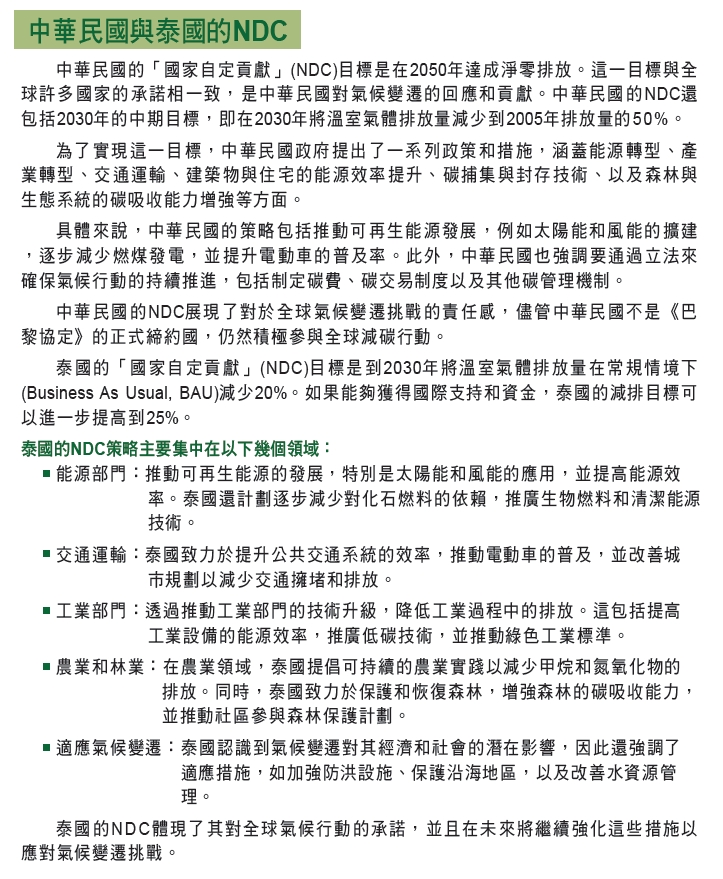Tech News | The Nationally Determined Contribution (NDC) of Taiwan and Thailand
source: ESG Service Corporation Association 碳中和科技聯盟協會
For further detail info: 泰國碳中和科技聯盟 電子報20240815
Taiwan's NDC policy:
The Republic of China (Taiwan) has established a Nationally Determined Contribution (NDC) centered on achieving net-zero emissions by 2050, in accordance with global climate change mitigation efforts. Furthermore, Taiwan has set a mid-term target to reduce greenhouse gas emissions to 50% of the 2005 levels by 2030. These ambitious goals will be pursued through a comprehensive set of policies and measures encompassing energy transition, industrial transformation, transportation, energy efficiency in buildings and residential areas, carbon capture and storage technologies, and bolstering the carbon absorption capacity of forests and ecosystems.
Specifically, Taiwan’s strategies entail advancing the development of renewable energy sources, such as the expansion of solar and wind energy, alongside the gradual reduction of coal-fired power generation and the increased adoption of electric vehicles. Moreover, Taiwan places significant emphasis on legislative initiatives to advance climate action, including the implementation of carbon pricing, carbon trading systems, and other carbon management mechanisms. Despite not being a formal party to the Paris Agreement, Taiwan actively engages in global carbon reduction initiatives.
Thailand's NDC aims to effectuate a 20% reduction in greenhouse gas emissions from the Business As Usual (BAU) scenario by 2030, with the potential for a higher 25% reduction contingent upon access to international support and funding.
Thailand's NDC strategy primarily focuses on the following sectors:
- Energy: Thailand aims to boost renewable energy, such as solar and wind power, while also improving energy efficiency. The country plans to reduce its reliance on fossil fuels by promoting biofuels and clean energy technologies.
- Transportation: Thailand aims to enhance its public transportation, promote electric vehicle adoption, and improve urban planning to reduce traffic congestion and emissions.
- Industry: Through technological upgrades in the industrial sector, Thailand aims to reduce emissions from industrial processes. This includes improving the energy efficiency of industrial equipment, promoting low-carbon technologies, and advancing green industry standards.
- Agriculture and Forestry: In agriculture, Thailand advocates for sustainable farming practices to reduce methane and nitrous oxide emissions. Meanwhile, Thailand is committed to protecting and restoring forests, enhancing their carbon absorption capacity, and encouraging community participation in forest conservation programs.
- Climate Change Adaptation: Recognizing the potential impact of climate change on its economy and society, Thailand also emphasizes adaptation measures, such as strengthening flood control infrastructure, protecting coastal areas, and improving water resource management.
For further detail info: 泰國碳中和科技聯盟 電子報20240815


